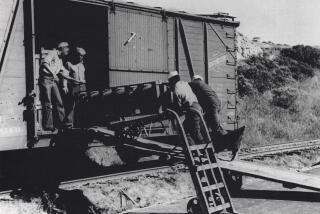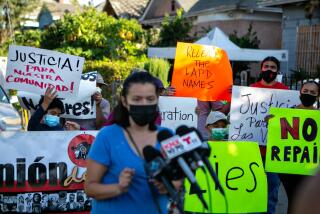Japan Ordered to Pay Koreans in 1945 Blast
TOKYO — A Japanese court ruled Thursday that the nation’s government is responsible for the deaths of Korean slave laborers from a 1945 explosion on a navy transport ship.
Legal scholars said the decision puts Japan another modest step closer to accepting responsibility for its role in World War II and should make it easier for plaintiffs in an estimated 60 slave labor cases to obtain compensation.
That said, the results were far from sweeping.
About 80 Koreans, including survivors or relatives of those on board the transport Ukishima Maru, were seeking a total of $25 million in compensation and an official apology. The explosion shortly after the war’s end quickly sank the ship, killing at least 524 Koreans and 25 Japanese crew members.
Instead, 15 plaintiffs--those the court said it could confirm had lived through the tragedy--received a total of $375,000, though the court said an apology was beyond its purview.
“They should have received much more, of course,” said Masayoshi Nakata, the lead attorney for the plaintiffs. “After suffering mental distress for more than half a century, $25,000 per person is hardly enough. And most of all, they sought a heartfelt apology.”
The Koreans’ disappointment was compounded by what Nakata said amounted to foot-dragging by the government, which declined to share documents or information about what happened 56 years ago as the Koreans were being returned home from Japan.
Japan colonized Korea from 1910 to 1945. During World War II, tens of thousands of Koreans and Chinese were forced to work in slave-like conditions in mines, ports and factories throughout Japan’s empire.
The plaintiffs and other survivors of the Ukishima Maru disaster believe that Japanese authorities set off the explosion off Maizuru, a port in Kyoto prefecture, to prevent an uprising by many of the estimated 4,000 Koreans aboard. The blast occurred Aug. 24, 1945, less than two weeks after Japan agreed to surrender.
In the ruling, however, presiding judge Satoshi Mizukami of the Kyoto District Court said the vessel hit a mine and that it wasn’t possible to tell whether the explosive had been planted by U.S. or Japanese forces.
Nakata noted the stark contrast between Japan’s handling of this case, first filed in 1992, and its approach to the Ehime Maru, a fisheries boat that sank off Honolulu in February when it was accidentally struck by a U.S. submarine.
“Japan investigated the Ehime Maru case as soon as it happened and called for a full admission of responsibility,” he said. “In this case, however, the government wasn’t forthcoming. We want a full investigation.”
He added that no decision has been made on whether to appeal.
Still, the case--along with a decision last month by a Tokyo court to grant the relatives of a Chinese slave laborer $166,000 for 10 years of hardship related to his captivity by the Japanese army--suggests a cautious move in the direction of accepting more responsibility.
And the government clearly saw the Ukishima Maru decision as a setback.
“It is a very tough ruling for us,” said Yasuo Fukuda, the government’s chief Cabinet secretary. “We’d like to consider carefully how we’re going to deal with this issue in the future.”
Takao Tanase, law professor at Kyoto University, said Japan still maintains that it need not compensate individual Koreans or Chinese, because their cases were covered under bilateral treaties signed in the 1970s and ‘80s.
Plaintiffs, however, have found growing sympathy in the court when they can show damage caused not by the war itself but some related circumstance that could be construed as calling for “normal compensation.” In this case, for instance, the court held that the government had a responsibility to provide safe transport but avoided the broader issue of slave labor.
“The government is reluctant to apologize, because that opens it up to all sorts of claims,” Tanase said. “Still, underlying this decision is a strong sentiment, especially in liberal circles, that Japan should be more open to war-related claims.”
By ordering compensation at all, the court took the significant step of admitting, in effect, that Japan’s past actions were illegal, said attorney Taizo Morita, who represents several Chinese plaintiffs in another slave labor case.
And while $375,000 is relatively modest, it suggests the pattern that might be followed to settle cases for hundreds of thousands of war-related sufferers worldwide. The U.S. government paid $20,000 per person to Japanese Americans held in internment camps, while Japan has given about $16,600 each to some of the women forced into prostitution by its military.
“The court probably settled on this amount with an eye to future compensation,” Morita said.
For most average Koreans here, however, money is secondary, said Hong Kyung Chul, a 24-year-old South Korean student at Tokyo’s Waseda University. “They just try and pay something, but they fail to recognize any of the victims’ pain or suffering. There’s still no apology.”
*
Hisako Ueno of The Times’ Tokyo Bureau contributed to this report.
More to Read
Sign up for Essential California
The most important California stories and recommendations in your inbox every morning.
You may occasionally receive promotional content from the Los Angeles Times.










